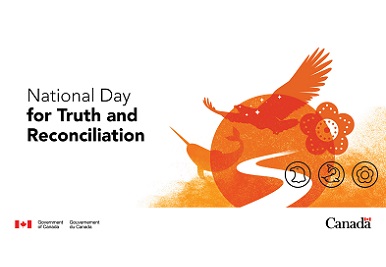National Day for Truth and Reconciliation
Sep 29, 2023
Together as an organization and as individual staff members, we recognize the importance of September 30th, Canada’s National Day for Truth and Reconciliation and Orange Shirt Day.
Hatfield is observing National Day for Truth and Reconciliation to honour survivors, their families and communities, and to help ensure that public commemoration of the history and legacy of residential schools remains a vital component of the reconciliation process in line with the Truth and Reconciliation Commission’s Call to Action #80.
To help observe this important day Hatfield provides this day off to give our staff time and space to properly honour those affected. We hope that Hatfield staff, and all Canadians, will reflect on the legacy of the residential school system, wear orange shirts in the spirit of reconciliation, and continue to educate themselves and their families.
This year, we revised our Indigenous Relations and Reconciliation Policy to harmonize our standards of action with the United Nations Declaration on the Rights of Indigenous Peoples (UNDRIP) as a reconciliation framework and an affirmation of our commitment to, “apply its principles, norms, and standards to corporate policy and core operational activities involving Indigenous peoples and their lands and resources.”
Hatfield is a leader in fisheries and aquatic environmental management, with pacific salmon as a focal point. We know that salmon are integral to the xʷməθkʷəy̓əm (Musqueam), Sḵwx̱wú7mesh (Squamish), and Səl̓ílwətaɬ (Tsleil-Waututh) Nations, who come before us on the traditional and unceded territory where our head office is located in North Vancouver. We are happy to support the Indigenous led Save our Salmon Coalition led by:
- First Nations Fisheries Council (fnfisheriescouncil.ca);
- Lower Fraser Fisheries Alliance (lffa.ca);
- Upper Fraser Fisheries Conservation Alliance (upperfraser.ca); and
- Pacific Salmon Foundation (PSF.ca)
Over the past year, we worked with over 60 Indigenous Nations in Western Canada, which has given us the opportunity to learn about their cultures, interests, aspirations, and challenges. When we work with proponents on proposed projects we seek consensus and take into account unique Indigenous perspectives and knowledge to complement Western environmental and social science-based approaches. We communicate openly to understand each other’s perspectives and focus on achieving common goals.
We encourage everyone to take this time to reflect on the legacy of residential schools in Canada, and the impact they have had upon Indigenous lives and communities. There are many ways that you can take action to support reconciliation in your personal life.
Suggested Reading:
- Reports and Calls to Action of the Truth and Reconciliation Commission.
- United Nations Declaration on the Rights of Indigenous Peoples.
- “The Inconvenient Indian” by Indigenous author Thomas King.
- “Beyond the Orange Shirt” by Phyllis Webstad, founder of the Orange Shirt Day movement.
Other Ideas for Action:
- Sign up for the University of Alberta’s free course on Indigenous Canada.
- Learn about the land you inhabit and who calls it home at https://native-land.ca/.
- Be an Indigenous Ally – learn about the impact of residential schools and amplify Indigenous voices by sharing what you’ve learned with your friends and family.
- Need more ideas of positive actions you can take? This list of 150 acts of reconciliation may provide some inspiration.
